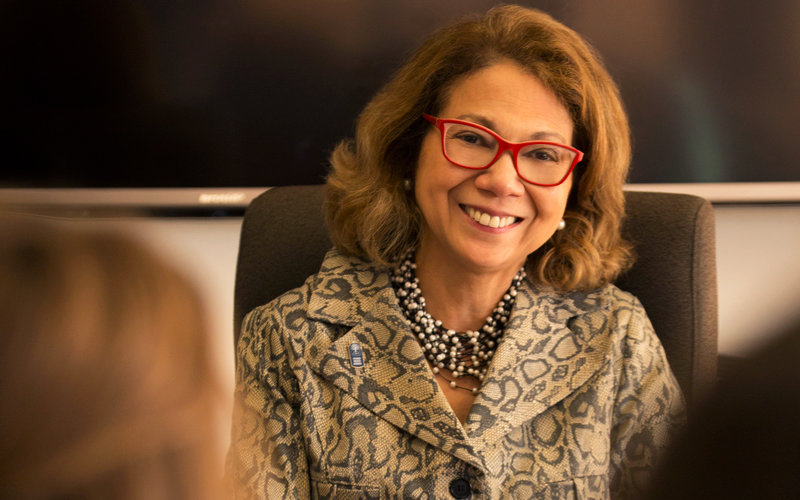
Making her mark as a leader firmly committed to equity and inclusion at Cal State Fullerton, President Mildred García reflects on her journey to becoming
the 11th female president — and the first Latina president — in the California State University system.
What was your experience like as a woman coming up through the ranks?
In my journey from first-generation college student to the first Latina president in the largest system of higher education in the country, there have been and continue to be glass ceilings — from the high school counselor who said I “wasn’t college material” to a former colleague who told me I was aiming “too high” in pursuing a doctorate. This is an everyday reality for girls, women, people of color and low-income students who dare to dream beyond what society expects of them, compounding our collective responsibility to mentor and support them until the ceiling that loomed over them not only cracks, but turns to gravel beneath their feet.
Why is it important for women to have female leaders and mentors in their field of choice?
Equality only works if everyone starts from the same place. As president of a university that serves more than 40,000 students, I know firsthand that cultural differences, socioeconomic backgrounds, gender and many other things create obstacles to equitable access and participation. Not everyone starts from the same place, especially women, low-income students and people of color, underscoring the need to ensure they have mentors and role models who look like them, come from their neighborhoods and speak their language — both literally and metaphorically.
I recently met one of our faculty members who hyphenated her last name when she married so her students know she is Latina. Shortly thereafter, she was teaching an online course in which a first-generation Latina student reached out to her because she recognized her last name as being Hispanic. She ended up mentoring that student, who went on to earn a Ph.D. and is now teaching at Cal State Fullerton alongside her mentor. This is not an isolated incident, and the generational impact of underrepresented students and women being mentored by underrepresented and women faculty is the cornerstone of much of our success.
What is the University’s role in encouraging more women to become leaders in their communities and careers?
Cal State Fullerton’s student body is 56 percent women, more than half of whom are the first in their family to attend college, and we are first in California and 10th in the nation in bachelor’s degrees earned by women, underscoring our responsibility to ensure our female students are prepared to work and lead in a global society. Our strategic plan and the President’s Commission on Equity and Inclusion are just two initiatives that speak to our efforts to ensure gender diversity remains prevalent, not just on our search committees, but in the candidate pools from which they will be hiring. Today, our leadership ranks reflect the diversity of our student body — six of our nine deans are women and one of our six vice presidents is a woman — creating an environment of mentorship, support and nurturing for women and all students who look to the campus leadership to see what is possible.
What is your most important contribution as a leader?
Working collaboratively with all faculty and staff members so that we, as a campus community, know and understand the students we serve in their language and
space. Then, with that knowledge and understanding in place, ensuring that the institution is adapting and evolving with our communities so that all students — regardless of their background, age, ethnicity, sexual orientation, gender or economic standing — have equitable access to gain acceptance to, enroll in, succeed at and graduate from college.
What Is your leadership style?
Collaboration, accountability, transparency and diversity. I recognize that our diverse campus community is made up of some of the most intelligent and innovative minds in the world — bright, creative faculty, staff and students whose potential transcends their job descriptions, resumes, backgrounds or degrees. I aim to nurture this potential and ensure that every Titan has a voice at the table and a vested interest in having it heard. I feel it is equally imperative that we listen and contribute to the campuswide dialogue that emerges, empower our colleagues to transform that conversation into strategic initiatives that align with our universitywide mission, and hold them accountable for the work they’ve committed to.